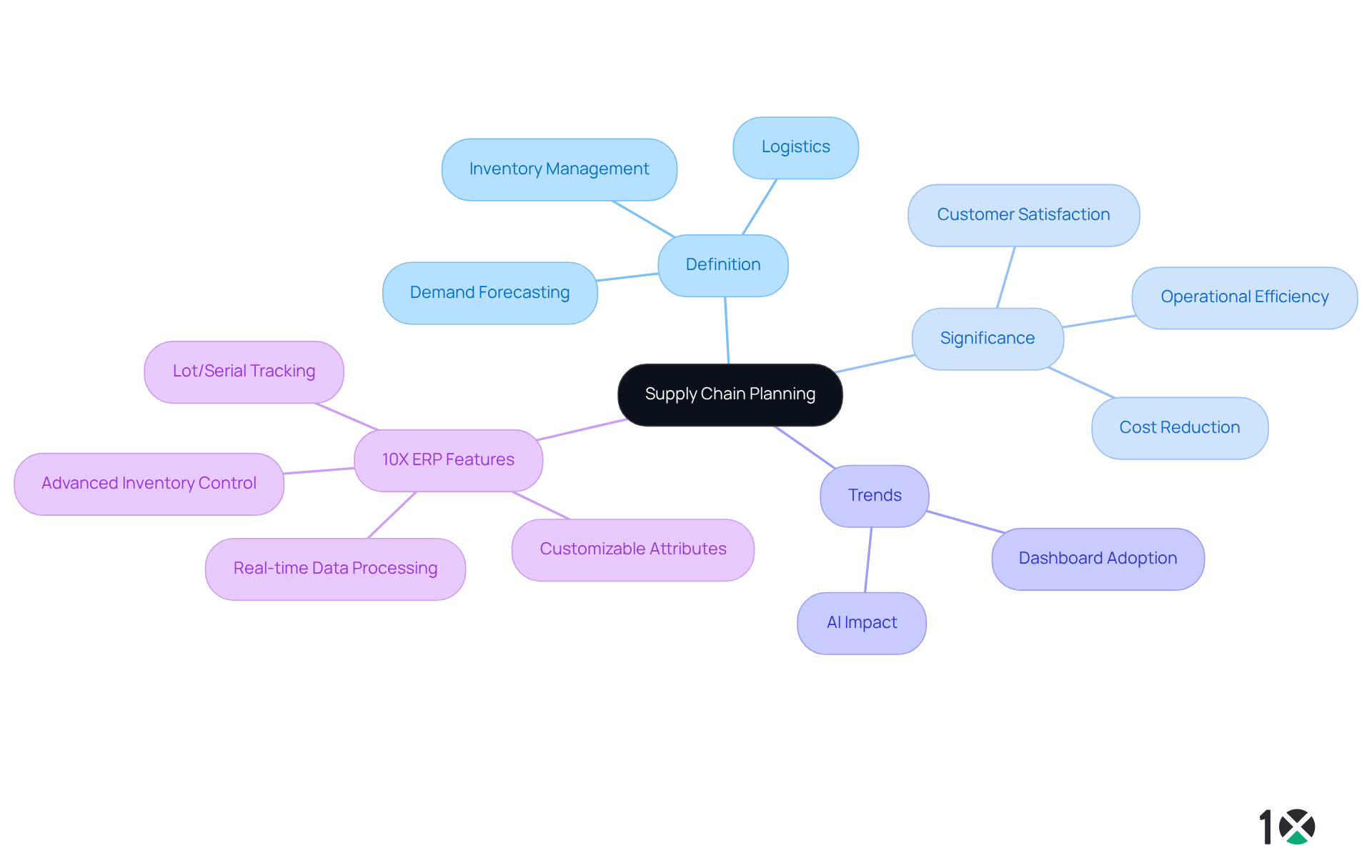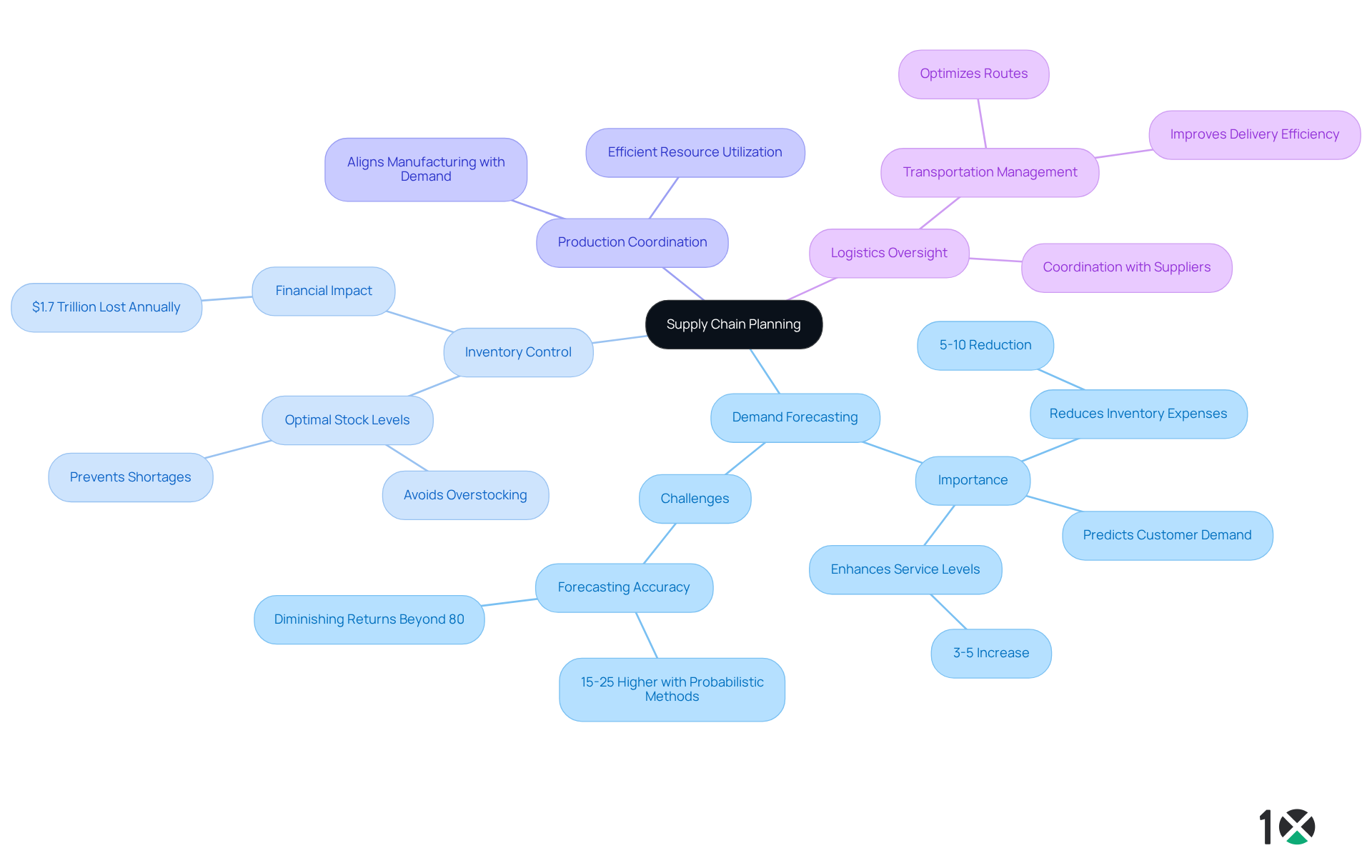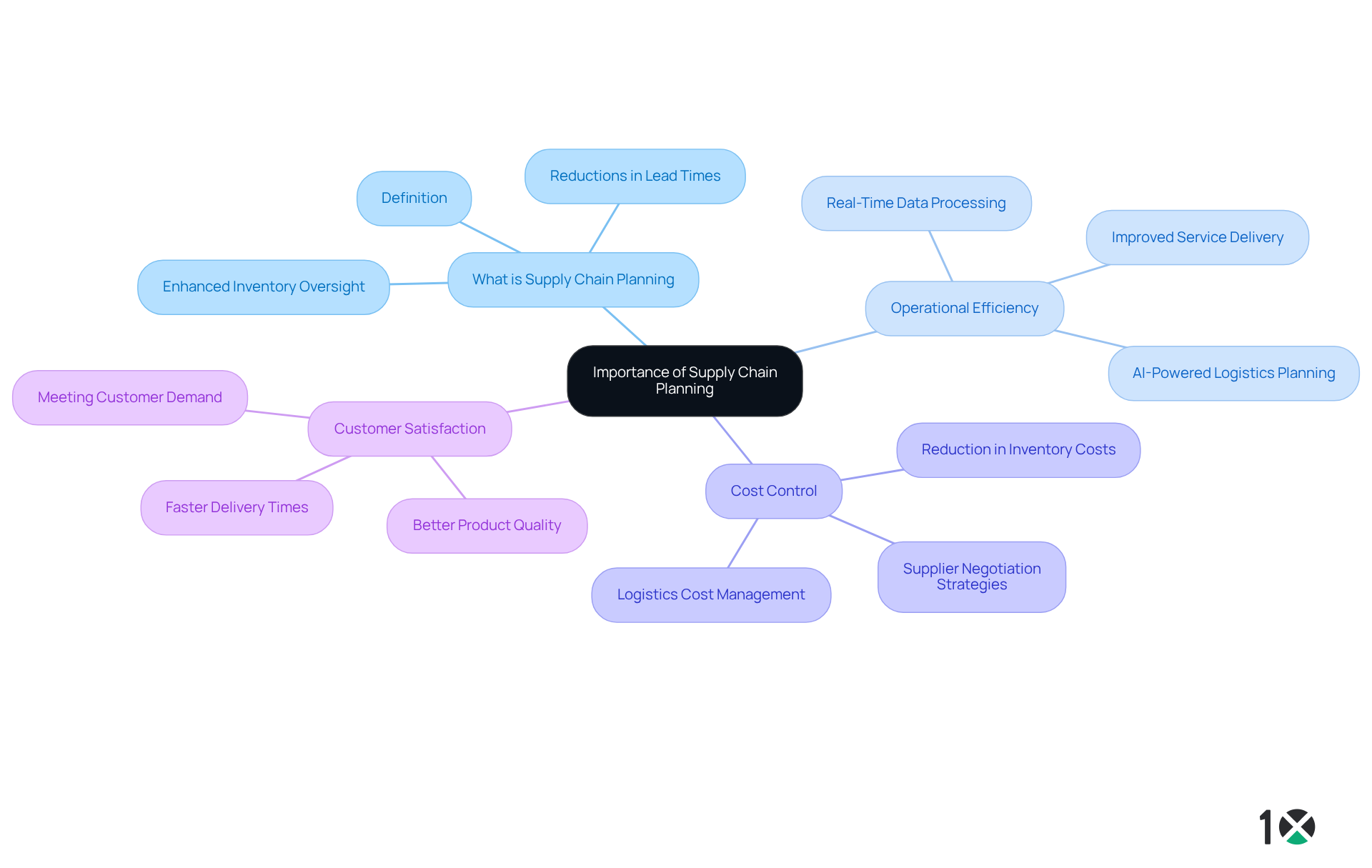Overview
Supply chain planning (SCP) serves as a strategic process that meticulously aligns the movement of goods, services, and information from suppliers to customers. It emphasizes critical activities such as:
- Demand forecasting
- Inventory management
- Logistics oversight
The significance of SCP is profound; it enhances operational efficiency, reduces costs, and improves customer satisfaction. This is particularly evident with advancements in technology and tools like 10X ERP, which empower businesses to respond swiftly to market changes and optimize their logistics management. As operations managers face increasing challenges, embracing effective SCP strategies is essential for maintaining a competitive edge.
Introduction
Understanding the intricate web of supply chain planning is essential for businesses striving to thrive in an increasingly competitive landscape. This strategic process streamlines the flow of goods and information, enhances operational efficiency, reduces costs, and elevates customer satisfaction. As organizations grapple with rapid technological advancements and evolving market demands, a critical question emerges: how can businesses effectively harness the power of supply chain planning to not only survive but excel in this dynamic environment? This exploration is not merely academic; it is a vital consideration for any organization aiming to maintain a competitive edge.
Define Supply Chain Planning and Its Significance
What is supply chain planning involves a strategic process that effectively aligns and enhances the movement of goods, services, and information from suppliers to customers. This encompasses essential activities such as demand forecasting, inventory management, production organization, logistics, and understanding what is supply chain planning. The significance of SCP is underscored by its capacity to enhance operational efficiency, reduce costs, and elevate customer satisfaction. As we approach 2025, companies that adeptly oversee their logistics can expect prompt product deliveries, minimized stock shortages, and swift responses to market changes—all contributing to a competitive advantage in the marketplace.
Recent trends indicate a growing recognition of the transformative potential that advanced technologies hold for logistics planning. Notably, 51% of businesses believe that artificial intelligence will significantly impact logistics management, facilitating more precise forecasting and streamlined operations. Moreover, nearly 80% of companies are embracing end-to-end dashboards to achieve comprehensive visibility into their logistics metrics, a crucial element for informed decision-making.
Real-world examples further illustrate the effectiveness of SCP in enhancing customer satisfaction. Organizations that have integrated cutting-edge inventory and network optimization tools report improved responsiveness to customer demands, fostering increased loyalty and retention. As companies continue to navigate the complexities of global logistics, a robust logistical strategy remains vital for achieving operational excellence and meeting evolving consumer expectations.
In this context, 10X ERP emerges as a formidable cloud-based ERP solution tailored for wholesale distributors. It offers robust features including:
- Real-time data processing
- Advanced inventory control
- Customizable attributes
- Lot/serial item tracking
With its intuitive interface and seamless integrations, 10X ERP empowers organizations to enhance their logistics management efficiently. Given that the worldwide distribution network market is projected to double in size over the next decade, the competitive advantages provided by 10X ERP—featuring innovative capabilities and exceptional support—will be essential for distributors aiming to thrive in a dynamic market environment.

Trace the Evolution of Supply Chain Planning
The evolution of resource management can be traced back to the early 20th century, a time when companies began to recognize the critical importance of effective logistics. Initially, logistics coordination focused primarily on transportation and storage. However, the advent of technology in the 1960s marked a turning point, as companies started to implement computerized systems for inventory control. The introduction of enterprise resource planning (ERP) systems in the 1980s revolutionized logistics planning by integrating various functions into a single platform.
Today, understanding what is supply chain planning (SCP) involves leveraging advanced technologies such as artificial intelligence and machine learning, which empower businesses to optimize their operations and enhance decision-making processes. With the global logistics oversight market projected to reach USD 48.6 billion by 2030, reflecting a compound annual growth rate (CAGR) of 11.1%, it is evident that effective logistics oversight is essential for improving customer satisfaction and operational efficiency.
In this landscape, 10X ERP emerges as a comprehensive cloud-based solution specifically designed for distributors. It offers a seamless user experience, lightning-fast performance, and real-time data processing. With features such as top-tier accounting, enhanced inventory oversight, limitless integrations, and transparent pricing, 10X ERP addresses critical challenges like compliance and visibility in logistics, enabling companies to navigate this dynamic environment with agility.
Moreover, the unparalleled support provided by 10X ERP enhances the overall user experience, positioning it as a valuable partner in achieving operational flexibility and efficiency. Importantly, it ensures data integrity and security through continuous data backup, reinforcing its role as an indispensable tool in the modern logistics landscape.

Identify Key Components of Supply Chain Planning
The essential elements of supply chain organization, including what is supply chain planning, encompass:
- Demand forecasting
- Inventory control
- Production coordination
- Logistics oversight
Demand forecasting is essential in understanding what is supply chain planning, as it predicts customer demand and ensures that the right products are available at the right time. Precise forecasts can reduce inventory expenses by 5-10% and elevate service levels by 3-5%, underscoring the financial benefits of effective demand management.
Inventory oversight focuses on maintaining optimal stock levels, which is essential to prevent shortages or surplus inventory. Alarmingly, approximately $1.7 trillion is lost each year due to stockouts and overstocking. To understand what is supply chain planning, it’s important to recognize that production planning coordinates manufacturing processes to align with demand, ensuring efficient resource utilization. Furthermore, logistics coordination manages the transportation and distribution of goods, optimizing routes and schedules to improve delivery efficiency.
Together, these elements forge a cohesive logistics strategy that not only enhances operational efficiency but also improves responsiveness to market fluctuations. This ultimately drives customer satisfaction and contributes to business success.

Explain the Importance of Supply Chain Planning for Businesses
Effective supply chain planning is crucial for businesses, significantly impacting:
- What is supply chain planning
- Operational efficiency
- Cost control
- Customer satisfaction
Understanding what is supply chain planning allows organizations that adopt robust practices to achieve notable reductions in lead times and inventory costs while enhancing service levels. For instance, consider the case of 10X ERP’s cloud-based solutions, which offer real-time data processing and enhanced inventory oversight. This capability allows companies to react swiftly to market changes, thereby improving overall service delivery.
This strategic approach not only aids in risk management and the identification of new opportunities but also fosters growth and profitability. Industry leaders consistently demonstrate that effective supply chain planning, which answers what is supply chain planning, supported by advanced tools like 10X ERP, serves as a cornerstone for maintaining competitive advantage and optimizing overall supply chain performance. By embracing these practices, businesses position themselves for sustained success in a dynamic marketplace.

Conclusion
Supply chain planning is a vital strategic process that guarantees the seamless movement of goods, services, and information from suppliers to customers. Its significance lies in enhancing operational efficiency, reducing costs, and improving customer satisfaction. In an era of increasing competition and evolving market demands, mastering supply chain planning is essential for achieving sustainable success.
This article highlights several key components of effective supply chain planning, including:
- Demand forecasting
- Inventory control
- Production coordination
- Logistics oversight
Each element plays a crucial role in optimizing operations and responding to market fluctuations. Moreover, the integration of advanced technologies, such as artificial intelligence and cloud-based solutions like 10X ERP, is transforming how organizations manage their supply chains, ensuring agility and competitiveness.
In conclusion, the importance of supply chain planning extends beyond mere logistics; it is a foundational aspect of business strategy that drives efficiency, cost-effectiveness, and customer loyalty. As companies navigate the complexities of modern supply chains, embracing robust planning practices and innovative tools will be key to unlocking new opportunities and achieving long-term growth. Organizations are encouraged to invest in these strategies to meet current demands and prepare for the challenges of tomorrow’s dynamic market landscape.
Frequently Asked Questions
What is supply chain planning (SCP)?
Supply chain planning is a strategic process that aligns and enhances the movement of goods, services, and information from suppliers to customers. It includes activities such as demand forecasting, inventory management, production organization, and logistics.
Why is supply chain planning significant?
SCP is significant because it enhances operational efficiency, reduces costs, and improves customer satisfaction. Companies that effectively manage their logistics can expect timely product deliveries, reduced stock shortages, and quick responses to market changes, which contribute to a competitive advantage.
What recent trends are influencing supply chain planning?
Recent trends indicate a growing recognition of the impact of advanced technologies on logistics planning. For example, 51% of businesses believe artificial intelligence will significantly improve logistics management, and nearly 80% are adopting end-to-end dashboards for better visibility into logistics metrics.
How does supply chain planning enhance customer satisfaction?
Organizations that use advanced inventory and network optimization tools report improved responsiveness to customer demands, which leads to increased customer loyalty and retention.
What is 10X ERP and how does it relate to supply chain planning?
10X ERP is a cloud-based ERP solution designed for wholesale distributors. It offers features such as real-time data processing, advanced inventory control, customizable attributes, and lot/serial item tracking, which help organizations improve their logistics management.
What advantages does 10X ERP provide to distributors?
10X ERP provides competitive advantages through its innovative capabilities and exceptional support, which are essential for distributors looking to succeed in a rapidly evolving market, especially as the worldwide distribution network market is projected to double in size over the next decade.
